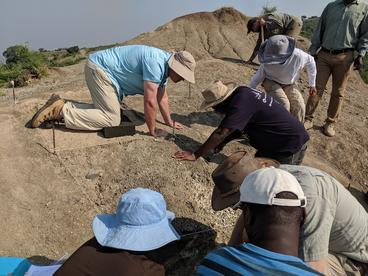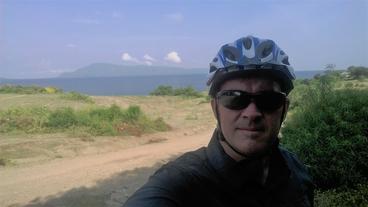Kieran McNulty returned to Kenya for his field work recently for the first time since the pandemic began. As a professor of anthropology focusing on early apes and the evolutionary context in which they lived and evolved, McNulty typically travels to Kenya twice a year to excavate or survey for fossils and to work in the National Museums of Kenya on previous years’ collections.
McNulty’s travel was more complicated this year.
“Kenya doesn’t have the infrastructure to manage the pandemic that we do,” he explained. “But the people there were excited to continue working on the project.”
According to McNulty, many casual employment opportunities have been lost during the pandemic. He regularly hires between 10 and 50 people from the local area. Some learn to excavate and find and identify fossils, others help take care of record keeping and cooking.

“They know the land far better than we do, and our collaborations with local communities and with the National Museums are critical to our success,” McNulty said.
The sites McNulty works on are 17–22 million years old. His research seeks to understand the habits and evolutionary relationships of apes to each other.
“If you’re interested in apes and this time period, the only place to go is eastern Africa,” he said.
McNulty’s team has found more than 100 species of vertebrate animals at the sites, along with invertebrates and fossil plant material. Everything they find stays in the country, as the fossils belong to the Kenyan people.
Raising funds for a free school

McNulty’s trip wasn’t only about research. He also runs a 501c3 organization to support a primary school on Rusinga Island, where his field site is located. On this trip, he biked 42 kilometers across rural Kenya to raise money for it.
“I challenged people to donate money for every kilometer I biked. The way this trip had been going, I didn’t think I’d get very far before something broke,” McNulty quipped. He was able to complete his planned route — from the county seat of Homa Bay to Rusinga Island — without any problems, though.
McNulty explained that fees for public schools in Kenya mean that the poorest people can’t afford them.
“If they can afford to send a child, they will usually just send a boy,” McNulty said. “Girls often get left out.”
This free school, run by a local community-based organization, serves about 160 kids aged 3–12 years old.
McNulty’s bike ride raised several thousand dollars. For just $3,000, the entire school can operate for a month, including serving two meals a day to students.
“I continue to be astonished by the incredible generosity of people, both on Rusinga Island and around the world,” McNulty said. “That people are willing to give of their time and treasure to help others, even people on another continent, provides inspiration for both facets of my work in Kenya.”
